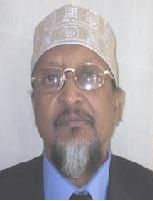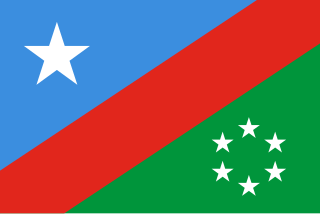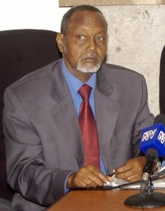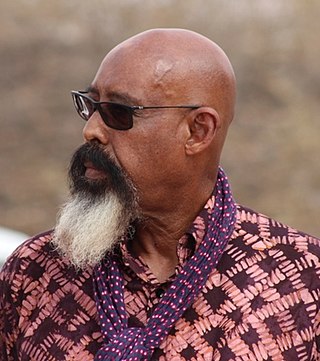Related Research Articles

Hassan Abshir Farah was a Somali politician. He previously served as mayor of Mogadishu and interior minister of Puntland. From November 12, 2001 to November 8, 2003, he was also prime minister of Somalia. Farah was an MP in the Federal Parliament of Somalia.

Kismayo is a port city in the southern Lower Juba province of Somalia. It is the commercial capital of the autonomous Jubaland region.
Hussein Mohamed Farrah Aidid is the son of General Mohamed Farrah Aidid. His father was leader of the Somali National Alliance (SNA), the faction that fought UNOSOM II and US forces during 1993.
Barre Adan Shire, also known as Barre Hiiraale, Barre "Hirale" Aden Shire, or Abdikadir Adan Shire, is a former Minister of Defense of the Somali Transitional Federal Government (TFG). He was previously the TFG Minister for National Reconstruction and Resettlement. Hiiraale was also the chairman of the now defunct Juba Valley Alliance, which controlled Southern and Southwestern Somalia, including the nation's third-largest city, the strategic port town of Kismayo. During his time in office, Hiiraale presided over the country's largest autonomous area, as well as commanding an extensive militia.

The Rahaweyn Resistance Army (RRA), also known as the Reewin Resistance Army, is an autonomist militant group operating in the Southern Somalia. It was the first Reewin armed faction to emerge during the Somali civil war. The stated goal of the RRA is the creation and recognition of an independent state of Maayland. It was led by Hasan Muhammad Nur Shatigadud (1946-2013).
The United Somali Congress (USC) was one of the major rebel organizations in Somalia. Formed in 1989, it played a leading role in the ouster of the government of Siad Barre in 1991, and became a target of the Unified Task Force campaign in 1993. Following infighting, the USC later splintered into smaller groups. By 2000, with the establishment of a Transitional National Government (TNG), a process of disarmament was put in motion and some moderate ex-USC leaders were incorporated into the new interim administration.

The Transitional National Government (TNG) was the internationally recognized central government of Somalia from 2000 to 2004.

The 2006 Islamic Courts Union offensive is the period in the Somali Civil War that began in May 2006 with the Islamic Courts Union's (ICU) conquest of Mogadishu from the Alliance for the Restoration of Peace and Counter-Terrorism (ARPCT) and continued with further ICU expansion in the country. Following the outbreak of the war on December 21, 2006; by December 24, direct Ethiopian intervention in the conflict in support of the Transitional Federal Government (TFG) was no longer denied by the Ethiopian government. The Eritrean government denied any involvement despite Ethiopian claims to the contrary.
The Somali Patriotic Movement was a major politico-military faction during the early years of the Somali Civil War. It was founded and commanded by ahmed Omar Jess who were based in what is presently Jubaland region.
Following the civil war and the ensuing societal chaos, some factions managed to exert a degree of authority over certain regions of Somalia where they maintained broad, clan-based support. This allowed these factions to establish working administrations and eventually coherent states, and restored order to their regions. This occurred first in Puntland, Southwestern Somalia, Galmudug, Jubaland and finally Banadir.
The Juba Valley Alliance is a political faction of the Somali Civil War. It was the primary opponent of the Somali Patriotic Movement (SPM) and the Somali Reconciliation and Restoration Council (SRRC) vying for the control of Kismayo and the Juba River valley, the area known as Jubaland.
The Somalia Reconciliation and Restoration Council (SRRC) was a political movement and paramilitary organization based in southern Somalia. It was founded in 2001 by Hussein Mohamed Farrah Aidid, son of the late faction leader Mohamed Farrah Aidid. Growing out of the Somali National Alliance (SNA) led by Aidid, the SRRC was originally formed to oppose the nascent Transitional National Government (TNG) and the Juba Valley Alliance (JVA) in the 2001-2004 period. However, it eventually settled differences with the government and some moderate leaders were incorporated into the new interim administration.

The transitional federal government (TFG) was the government of Somalia between 2004 and 2012. Established 2004 in Djibouti through various international conferences, it was an attempt to restore national institutions to the country after the 1991 collapse of the Siad Barre government and the ensuing Somali Civil War.

Colonel Hasan Muhammad Nur Shatigadud (1946-2013) was a Somali politician and faction leader. He served as the chairman of the Rahanweyn Resistance Army (RRA), and subsequently as the first President of the short-lived Southwestern Somalia autonomous regional state. Shatigadud was later a Member of the Transitional Federal Parliament, and was eventually appointed Minister of Finance in the Transitional Federal Government. Shatigadud was succeeded as president by Madobe Nunow.

Major General Mohammed Said Hersi Morgan, also known as General Morgan or Colonel Morgan, is a Somali military officer and former warlord. He was the son-in-law of Siad Barre and Minister of Defence of Somalia. He hails from the Majeerteen Darood clan.
Many factions opposed to Siad Barre set aside tribal and political differences to unite in purpose to overthrow his regime. After the collapse of Siad Barre's government in 1991 the nation fell into a long period of increasingly chaotic conflict between forces of clans, militias, warlords, separatist, religious functions and rebellion movements, other nations, and even the United Nations peacekeepers.
Abdullahi Sheikh Ismael is a Somali politician who is the Minister of internal Security of Somalia and also he is Member of Somali senate and sarved as vice president of Jubaland state of Somalia and former commander in the army of the Transitional Federal Government (TFG) of the Republic of Somalia.
The Allied Somali Forces (ASF) was a political faction of the Somali Civil War. It was the primary opponent of the Margans Malitia for the control of Kismayo and the Juba River valley, the area known as Jubaland.
Sheikh Mohamed Ali Facaye, is the director for the Kismayo Regional Islamic Courts under the government of the Juba Valley Alliance.

Jubaland, also known as Azania or the Juba Valley, is a Federal Member State in southern Somalia. Its eastern border lies 40–60 km (25–35 mi) east of the Jubba River, stretching from Dolow to the Indian Ocean, while its western side flanks the North Eastern Province in Kenya, which was carved out of Jubaland during the colonial period.
References
- ↑ SOMALIA: Interview with Barre Adan Shire, chairman of the Juba Valley Alliance (JVA) IRIN
- ↑ "Somali warlord quits peace talks". BBC. 2002-11-18. Retrieved 2007-01-13.